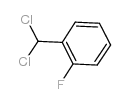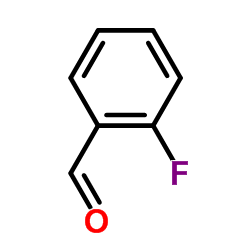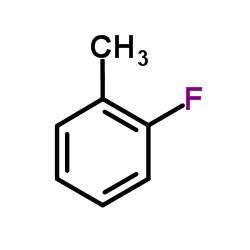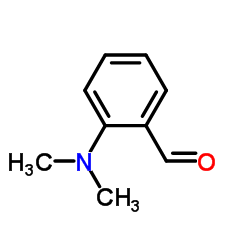320-65-0
| Name | 2-fluorobenzal chloride |
|---|---|
| Synonyms |
2-Fluorobenzal chloride
2-Fluoro-1-dichloromethylbenzene 2-Fluorobenzal chloride 5GR 1-Fluoro-2-dichlormethylbenzene 2-Fluorobenzalchloride o-Fluorbenzylidenchlorid EINECS 206-279-7 ortho-fluoro-benzal chloride 1-(Dichloromethyl)-2-fluorobenzene 1-Dichlormethyl-2-fluor-benzol o-fluorobenzalchloride MFCD00043797 |
| Density | 1.309 |
|---|---|
| Boiling Point | 224-232 °C |
| Molecular Formula | C7H5Cl2F |
| Molecular Weight | 179.01900 |
| Flash Point | 224-232°C |
| Exact Mass | 177.97500 |
| LogP | 3.30190 |
| Index of Refraction | 1.526-1.528 |
Synonym: Section 2 - COMPOSITION, INFORMATION ON INGREDIENTS
Risk Phrases: 34 Section 3 - HAZARDS IDENTIFICATION EMERGENCY OVERVIEW
Causes burns. Potential Health Effects Eye: Causes eye burns. Lachrymator (substance which increases the flow of tears). Skin: Causes skin burns. Ingestion: Causes gastrointestinal tract burns. Inhalation: Causes chemical burns to the respiratory tract. Chronic: Not available. Section 4 - FIRST AID MEASURES Eyes: Immediately flush eyes with plenty of water for at least 15 minutes, occasionally lifting the upper and lower eyelids. Get medical aid immediately. Skin: Get medical aid immediately. Immediately flush skin with plenty of water for at least 15 minutes while removing contaminated clothing and shoes. Ingestion: Do not induce vomiting. Get medical aid immediately. Inhalation: Get medical aid immediately. Remove from exposure and move to fresh air immediately. If not breathing, give artificial respiration. If breathing is difficult, give oxygen. Notes to Physician: Treat symptomatically and supportively. Section 5 - FIRE FIGHTING MEASURES General Information: As in any fire, wear a self-contained breathing apparatus in pressure-demand, MSHA/NIOSH (approved or equivalent), and full protective gear. Extinguishing Media: Use foam, dry chemical, or carbon dioxide. Section 6 - ACCIDENTAL RELEASE MEASURES General Information: Use proper personal protective equipment as indicated in Section 8. Spills/Leaks: Absorb spill with inert material (e.g. vermiculite, sand or earth), then place in suitable container. Section 7 - HANDLING and STORAGE Handling: Do not breathe dust, vapor, mist, or gas. Do not get in eyes, on skin, or on clothing. Use only in a chemical fume hood. Storage: Store in a cool, dry place. Store in a tightly closed container. Corrosives area. Section 8 - EXPOSURE CONTROLS, PERSONAL PROTECTION Engineering Controls: Facilities storing or utilizing this material should be equipped with an eyewash facility and a safety shower. Use adequate ventilation to keep airborne concentrations low. Exposure Limits CAS# 320-65-0: Personal Protective Equipment Eyes: Not available. Skin: Wear appropriate protective gloves to prevent skin exposure. Clothing: Wear appropriate protective clothing to prevent skin exposure. Respirators: Follow the OSHA respirator regulations found in 29 CFR 1910.134 or European Standard EN 149. Use a NIOSH/MSHA or European Standard EN 149 approved respirator if exposure limits are exceeded or if irritation or other symptoms are experienced. Section 9 - PHYSICAL AND CHEMICAL PROPERTIES Physical State: Liquid Color: clear light yellow Odor: Not available. pH: Not available. Vapor Pressure: Not available. Viscosity: Not available. Boiling Point: 224 - 232 deg C Freezing/Melting Point: Not available. Autoignition Temperature: Not available. Flash Point: Not available. Explosion Limits, lower: Not available. Explosion Limits, upper: Not available. Decomposition Temperature: Solubility in water: Specific Gravity/Density: 1.309 Molecular Formula: C7H5Cl2F Molecular Weight: 179.02 Section 10 - STABILITY AND REACTIVITY Chemical Stability: Not available. Conditions to Avoid: Incompatible materials. Incompatibilities with Other Materials: Strong oxidizing agents. Hazardous Decomposition Products: Hydrogen chloride, carbon monoxide, carbon dioxide, hydrogen fluoride gas. Hazardous Polymerization: Has not been reported Section 11 - TOXICOLOGICAL INFORMATION RTECS#: CAS# 320-65-0 unlisted. LD50/LC50: Not available. Carcinogenicity: 2-Fluorobenzal chloride - Not listed by ACGIH, IARC, or NTP. Section 12 - ECOLOGICAL INFORMATION Section 13 - DISPOSAL CONSIDERATIONS Dispose of in a manner consistent with federal, state, and local regulations. Section 14 - TRANSPORT INFORMATION IATA Shipping Name: CORROSIVE LIQUID, ACIDIC, ORGANIC, N.O.S.* Hazard Class: 8 UN Number: 3265 Packing Group: III IMO Shipping Name: CORROSIVE LIQUID, ACIDIC, ORGANIC, N.O.S. Hazard Class: 8 UN Number: 3265 Packing Group: III RID/ADR Shipping Name: CORROSIVE LIQUID, ACIDIC, ORGANIC, N.O.S. Hazard Class: 8 UN Number: 3265 Packing group: III Section 15 - REGULATORY INFORMATION European/International Regulations European Labeling in Accordance with EC Directives Hazard Symbols: C Risk Phrases: R 34 Causes burns. Safety Phrases: S 26 In case of contact with eyes, rinse immediately with plenty of water and seek medical advice. S 36/37/39 Wear suitable protective clothing, gloves and eye/face protection. S 45 In case of accident or if you feel unwell, seek medical advice immediately (show the label where possible). WGK (Water Danger/Protection) CAS# 320-65-0: 1 Canada CAS# 320-65-0 is listed on Canada's NDSL List. CAS# 320-65-0 is not listed on Canada's Ingredient Disclosure List. US FEDERAL TSCA CAS# 320-65-0 is listed on the TSCA inventory. SECTION 16 - ADDITIONAL INFORMATION N/A |
| Hazard Codes | C: Corrosive; |
|---|---|
| Risk Phrases | R34;R36 |
| Safety Phrases | S45-S36/37/39-S26 |
| RIDADR | 3265 |
| Packaging Group | II |
| Hazard Class | 8 |
| HS Code | 2903999090 |
|
~86% 
320-65-0 |
| Literature: Leonel, Eric; Paugam, Jean-Paul; Heintz, Monique; Nedelec, Jean-Yves Synthetic Communications, 1999 , vol. 29, # 22 p. 4015 - 4024 |
|
~% 
320-65-0 |
| Literature: Chemische Berichte, , vol. 70, p. 1416,1419 |
| HS Code | 2903999090 |
|---|---|
| Summary | 2903999090 halogenated derivatives of aromatic hydrocarbons VAT:17.0% Tax rebate rate:9.0% Supervision conditions:none MFN tariff:5.5% General tariff:30.0% |


